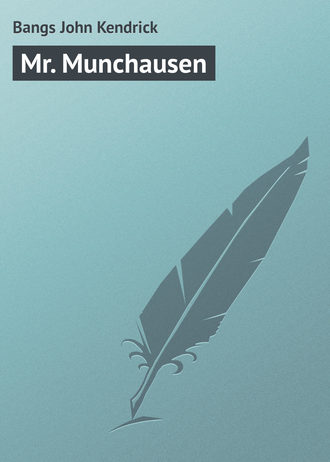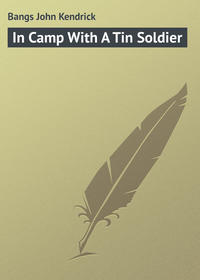 полная версия
полная версияMr. Munchausen
“Great Heavens, Baron,” I cried. “Where the dickens did they come from?”
“That’s what I asked myself,” said the Baron easily. “It seemed astounding at first glance, but investigation showed it after all to be a very simple proposition. The runaways after reaching the top of the hill turned to the left, and clattered on down toward the bridge over the inlet to the lake. The bridge broke beneath their weight and the horses soon found themselves struggling in the water. The harness was strong and the wagon never left them. They had to swim for it, and I am told by a small boy who was fishing on the lake at the time that they swam directly across it, pulling the wagon after them. Naturally with its open front and confined back and sides the wagon acted as a sort of drag-net and when the opposite shore was gained, and the wagon was pulled ashore, it was found to have gathered in all the fish that could not get out of the way.”
The Baron resumed his cigar, and I sat still eyeing the ample pattern of the drawing-room carpet.
“Pretty good catch for an afternoon, eh?” he said in a minute.
“Yes,” said I. “Almost too good, Baron. Those horses must have swam like the dickens to get over so quickly. You would think the trout would have had time to escape.”
“Oh I presume one or two of them did,” said Munchausen. “But the majority of them couldn’t. The horses were all fast, record-breakers anyhow. I never hire a horse that isn’t.”
And with that I left the old gentleman and walked blushing back to the office. I don’t doubt for an instant the truth of the Baron’s story, but somehow or other I feel that in writing it my reputation is in some measure at stake.
Note – Mr. Munchausen, upon request of the Editor of the Gehenna Gazette to write a few stories of adventure for his Imp’s page, conducted by Sapphira, contributed the tales which form the substance of several of the following chapters.
III
THREE MONTHS IN A BALLOON
Mr. Munchausen was not handsome, but the Imps liked him very much, he was so full of wonderful reminiscences, and was always willing to tell anybody that would listen, all about himself. To the Heavenly Twins he was the greatest hero that had ever lived. Napoleon Bonaparte, on Mr. Munchausen’s own authority, was not half the warrior that he, the late Baron had been, nor was Cæsar in his palmiest days, one-quarter so wise or so brave. How old the Baron was no one ever knew, but he had certainly lived long enough to travel the world over, and stare every kind of death squarely in the face without flinching. He had fought Zulus, Indians, tigers, elephants – in fact, everything that fights, the Baron had encountered, and in every contest he had come out victorious. He was the only man the children had ever seen that had lost three legs in battle and then had recovered them after the fight was over; he was the only visitor to their house that had been lost in the African jungle and wandered about for three months without food or shelter, and best of all he was, on his own confession, the most truthful narrator of extraordinary tales living. The youngsters had to ask the Baron a question only, any one, it mattered not what it was – to start him off on a story of adventure, and as he called upon the Twins’ father once a month regularly, the children were not long in getting together a collection of tales beside which the most exciting episodes in history paled into insignificant commonplaces.
“Uncle Munch,” said the Twins one day, as they climbed up into the visitor’s lap and disarranged his necktie, “was you ever up in a balloon?”
“Only once,” said the Baron calmly. “But I had enough of it that time to last me for a lifetime.”
“Was you in it for long?” queried the Twins, taking the Baron’s watch out of his pocket and flinging it at Cerberus, who was barking outside of the window.
“Well, it seemed long enough,” the Baron answered, putting his pocket-book in the inside pocket of his vest where the Twins could not reach it. “Three months off in the country sleeping all day long and playing tricks all night seems a very short time, but three months in a balloon and the constant centre of attack from every source is too long for comfort.”
“Were you up in the air for three whole months?” asked the Twins, their eyes wide open with astonishment.
“All but two days,” said the Baron. “For two of those days we rested in the top of a tree in India. The way of it was this: I was always, as you know, a great favourite with the Emperor Napoleon, of France, and when he found himself involved in a war with all Europe, he replied to one of his courtiers who warned him that his army was not in condition: ‘Any army is prepared for war whose commander-in-chief numbers Baron Munchausen among his advisers. Let me have Munchausen at my right hand and I will fight the world.’ So they sent for me and as I was not very busy I concluded to go and assist the French, although the allies and I were also very good friends. I reasoned it out this way: In this fight the allies are the stronger. They do not need me. Napoleon does. Fight for the weak, Munchausen, I said to myself, and so I went. Of course, when I reached Paris I went at once to the Emperor’s palace and remained at his side until he took the field, after which I remained behind for a few days to put things to rights for the Imperial family. Unfortunately for the French, the King of Prussia heard of my delay in going to the front, and he sent word to his forces to intercept me on my way to join Napoleon at all hazards, and this they tried to do. When I was within ten miles of the Emperor’s headquarters, I was stopped by the Prussians, and had it not been that I had provided myself with a balloon for just such an emergency, I should have been captured and confined in the King’s palace at Berlin, until the war was over.
“Foreseeing all this, I had brought with me a large balloon packed away in a secret section of my trunk, and while my body-guard was fighting with the Prussian troops sent to capture me, I and my valet inflated the balloon, jumped into the car and were soon high up out of the enemy’s reach. They fired several shots at us, and one of them would have pierced the balloon had I not, by a rare good shot, fired my own rifle at the bullet, and hitting it squarely in the middle, as is my custom, diverted it from its course, and so saved our lives.
“It had been my intention to sail directly over the heads of the attacking party and drop down into Napoleon’s camp the next morning, but unfortunately for my calculations, a heavy wind came up in the night and the balloon was caught by a northerly blast, and blown into Africa, where, poised in the air directly over the desert of Sahara, we encountered a dead calm, which kept us stalled up for two miserable weeks.”
“Why didn’t you come down?” asked the Twins, “wasn’t the elevator running?”
“We didn’t dare,” explained the Baron, ignoring the latter part of the question. “If we had we’d have wasted a great deal of our gas, and our condition would have been worse than ever. As I told you we were directly over the centre of the desert. There was no way of getting out of it except by long and wearisome marches over the hot, burning sands with the chances largely in favour of our never getting out alive. The only thing to do was to stay just where we were and wait for a favouring breeze. This we did, having to wait four mortal weeks before the air was stirred.”
“You said two weeks a minute ago, Uncle Munch,” said the Twins critically.
“Two? Hem! Well, yes it was two, now that I think of it. It’s a natural mistake,” said the Baron stroking his mustache a little nervously. “You see two weeks in a balloon over a vast desert of sand, with nothing to do but whistle for a breeze, is equal to four weeks anywhere else. That is, it seems so. Anyhow, two weeks or four, whichever it was, the breeze came finally, and along about midnight left us stranded again directly over an Arab encampment near Wady Halfa. It was a more perilous position really, than the first, because the moment the Arabs caught sight of us they began to make frantic efforts to get us down. At first we simply laughed them to scorn and made faces at them, because as far as we could see, we were safely out of reach. This enraged them and they apparently made up their minds to kill us if they could. At first their idea was to get us down alive and sell us as slaves, but our jeers changed all that, and what should they do but whip out a lot of guns and begin to pepper us.
“‘I’ll settle them in a minute,’ I said to myself, and set about loading my own gun. Would you believe it, I found that my last bullet was the one with which I had saved the balloon from the Prussian shot?”
“Mercy, how careless of you, Uncle Munch!” said one of the Twins. “What did you do?”
“I threw out a bag of sand ballast so that the balloon would rise just out of range of their guns, and then, as their bullets got to their highest point and began to drop back, I reached out and caught them in a dipper. Rather neat idea, eh? With these I loaded my own rifle and shot every one of the hostile party with their own ammunition, and when the last of the attacking Arabs dropped I found there were enough bullets left to fill the empty sand bag again, so that the lost ballast was not missed. In fact, there were enough of them in weight to bring the balloon down so near to the earth that our anchor rope dangled directly over the encampment, so that my valet and I, without wasting any of our gas, could climb down and secure all the magnificent treasures in rugs and silks and rare jewels these robbers of the desert had managed to get together in the course of their depredations. When these were placed in the car another breeze came up, and for the rest of the time we drifted idly about in the heavens waiting for a convenient place to land. In this manner we were blown hither and yon for three months over land and sea, and finally we were wrecked upon a tall tree in India, whence we escaped by means of a convenient elephant that happened to come our way, upon which we rode triumphantly into Calcutta. The treasures we had secured from the Arabs, unfortunately, we had to leave behind us in the tree, where I suppose they still are. I hope some day to go back and find them.”
Here Mr. Munchausen paused for a moment to catch his breath. Then he added with a sigh. “Of course, I went back to France immediately, but by the time I reached Paris the war was over, and the Emperor was in exile. I was too late to save him – though I think if he had lived some sixty or seventy years longer I should have managed to restore his throne, and Imperial splendour to him.”
The Twins gazed into the fire in silence for a minute or two. Then one of them asked:
“But what did you live on all that time, Uncle Munch?”
“Eggs,” said the Baron. “Eggs and occasionally fish. My servant had had the foresight when getting the balloon ready to include, among the things put into the car, a small coop in which were six pet chickens I owned, and without which I never went anywhere. These laid enough eggs every day to keep us alive. The fish we caught when our balloon stood over the sea, baiting our anchor with pieces of rubber gas pipe used to inflate the balloon, and which looked very much like worms.”
“But the chickens?” said the Twins. “What did they live on?”
The Baron blushed.
“I am sorry you asked that question,” he said, his voice trembling somewhat. “But I’ll answer it if you promise never to tell anyone. It was the only time in my life that I ever practised an intentional deception upon any living thing, and I have always regretted it, although our very lives depended upon it.”
“What was it, Uncle Munch?” asked the Twins, awed to think that the old warrior had ever deceived anyone.
“I took the egg shells and ground them into powder, and fed them to the chickens. The poor creatures supposed it was corn-meal they were getting,” confessed the Baron. “I know it was mean, but what could I do?”
“Nothing,” said the Twins softly. “And we don’t think it was so bad of you after all. Many another person would have kept them laying eggs until they starved, and then he’d have killed them and eaten them up. You let them live.”
“That may be so,” said the Baron, with a smile that showed how relieved his conscience was by the Twins’ suggestion. “But I couldn’t do that you know, because they were pets. I had been brought up from childhood with those chickens.”
Then the Twins, jamming the Baron’s hat down over his eyes, climbed down from his lap and went to their play, strongly of the opinion that, though a bold warrior, the Baron was a singularly kind, soft-hearted man after all.
IV
SOME HUNTING STORIES FOR CHILDREN
The Heavenly Twins had been off in the mountains during their summer holiday, and in consequence had seen very little of their good old friend, Mr. Munchausen. He had written them once or twice, and they had found his letters most interesting, especially that one in which he told how he had killed a moose up in Maine with his Waterbury watch spring, and I do not wonder that they marvelled at that, for it was one of the most extraordinary happenings in the annals of the chase. It seems, if his story is to be believed, and I am sure that none of us who know him has ever had any reason to think that he would deceive intentionally; it seems, I say, that he had gone to Maine for a week’s sport with an old army acquaintance of his, who had now become a guide in that region. Unfortunately his rifle, of which he was very fond, and with which his aim was unerring, was in some manner mislaid on the way, and when they arrived in the woods they were utterly without weapons; but Mr. Munchausen was not the man to be daunted by any such trifle as that, particularly while his friend had an old army musket, a relic of the war, stored away in the attic of his woodland domicile.
“Th’ only trouble with that ar musket,” said the old guide, “ain’t so much that she won’t shoot straight, nor that she’s got a kick onto her like an unbroke mule. What I’m most afeard ’on about your shootin’ with her ain’t that I think she’ll bust neither, for the fact is we ain’t got nothin’ for to bust her with, seein’ as how ammynition is skeerce. I got powder, an’ I got waddin’, but I ain’t got no shot.”
“That doesn’t make any difference,” the Baron replied. “We can make the shot. Have you got any plumbing in the camp? If you have, rip it out, and I’ll melt up a water-pipe into bullets.”
“No, sir,” retorted the old man. “Plumbin’ is one of the things I came here to escape from.”
“Then,” said the Baron, “I’ll use my watch for ammunition. It is only a three-dollar watch and I can spare it.”
With this determination, Mr. Munchausen took his watch to pieces, an ordinary time-piece of the old-fashioned kind, and, to make a long story short, shot for several days with the component parts of that useful affair rammed down into the barrel of the old musket. With the stem-winding ball he killed an eagle; with pieces of the back cover chopped up to a fineness of medium-sized shot he brought down several other birds, but the great feat of all was when he started for moose with nothing but the watch-spring in the barrel of the gun. Having rolled it up as tight as he could, fastened it with a piece of twine, and rammed it well into the gun, he set out to find the noble animal upon whose life he had designs. After stalking the woods for several hours, he came upon the tracks which told him that his prey was not far off, and in a short while he caught sight of a magnificent creature, his huge antlers held proudly up and his great eyes full of defiance.
For a moment the Baron hesitated. The idea of destroying so beautiful an animal seemed to be abhorrent to his nature, which, warrior-like as he is, has something of the tenderness of a woman about it. A second glance at the superb creature, however, changed all that, for the Baron then saw that to shoot to kill was necessary, for the beast was about to force a fight in which the hunter himself would be put upon the defensive.
“I won’t shoot you through the head, my beauty,” he said, softly, “nor will I puncture your beautiful coat with this load of mine, but I’ll kill you in a new way.”
With this he pulled the trigger. The powder exploded, the string binding the long black spring into a coil broke, and immediately the strip of steel shot forth into the air, made directly toward the neck of the rushing moose, and coiling its whole sinuous length tightly about the doomed creature’s throat strangled him to death.
As the Twins’ father said, a feat of that kind entitled the Baron to a high place in fiction at least, if not in history itself. The Twins were very much wrought up over the incident, particularly, when one too-smart small imp who was spending the summer at the same hotel where they were said that he didn’t believe it, – but he was an imp who had never seen a cheap watch, so how should he know anything about what could be done with a spring that cannot be wound up by a great strong man in less than ten minutes?
As for the Baron he was very modest about the achievement, for when he first appeared at the Twins’ home after their return he had actually forgotten all about it, and, in fact, could not recall the incident at all, until Diavolo brought him his own letter, when, of course, the whole matter came back to him.
“It wasn’t so very wonderful, anyhow,” said the Baron. “I should not think, for instance, of bragging about any such thing as that. It was a simple affair all through.”
“And what did you do with the moose’s antlers?” asked Angelica. “I hope you brought ’em home with you, because I’d like to see ’em.”
“I wanted to,” said the Baron, stroking the Twins’ soft brown locks affectionately. “I wanted to bring them home for your father to use as a hat rack, dear, but they were too large. When I had removed them from the dead animal, I found them so large that I could not get them out of the forest, they got so tangled up in the trees. I should have had to clear a path twenty feet wide and seven miles long to get them even as far as my friend’s hut, and after that they would have had to be carried thirty miles through the woods to the express office.”
“I guess it’s just as well after all,” said Diavolo. “If they were as big as all that, Papa would have had to build a new house to get ’em into.”
“Exactly,” said the Baron. “Exactly. That same idea occurred to me, and for that reason I concluded not to go to the trouble of cutting away those miles of trees. The antlers would have made a very expensive present for your father to receive in these hard times.”
“It was a good thing you had that watch,” the Twins observed, after thinking over the Baron’s adventure. “If you hadn’t had that you couldn’t have killed the moose.”
“Very likely not,” said the Baron, “unless I had been able to do as I did in India thirty years ago at a man hunt.”
“What?” cried the Twins. “Do they hunt men in India?”?
“That all depends, my dears,” replied the Baron. “It all depends upon what you mean by the word they. Men don’t hunt men, but animals, great wild beasts sometimes hunt them, and it doesn’t often happen that the men escape. In the particular man hunt I refer to I was the creature that was being hunted, and I’ve had a good deal of sympathy for foxes ever since. This was a regular fox hunt in a way, although I was the fox, and a herd of elephants were the huntsmen.”
“How queer,” said Diavolo, unscrewing one of the Baron’s shirt studs to see if he would fall apart.
“Not half so queer as my feelings when I realised my position,” said the Baron with a shake of his head. “I was frightened half to death. It seemed to me that I’d reached the end of my tether at last. I was studying the fauna and flora of India, in a small Indian village, known as ah – what was the name of that town! Ah – something like Rathabad – no, that isn’t quite it – however, one name does as well as another in India. It was a good many miles from Calcutta, and I’d been living there about three months. The village lay in a small valley between two ranges of hills, none of them very high. On the other side of the westerly hills was a great level stretch of country upon which herds of elephants used to graze. Out of this rose these hills, very precipitously, which was a very good thing for the people in the valley, else those elephants would have come over and played havoc with their homes and crops. To me the plains had a great fascination, and I used to wander over them day after day in search of new specimens for my collection of plants and flowers, never thinking of the danger I ran from an encounter with these elephants, who were very ferocious and extremely jealous of the territory they had come through years of occupation to regard as their own. So it happened, that one day, late in the afternoon, I was returning from an expedition over the plains, and, as I had found a large number of new specimens, I was feeling pretty happy. I whistled loudly as I walked, when suddenly coming to a slight undulation in the plain what should I see before me but a herd of sixty-three elephants, some eating, some thinking, some romping, and some lying asleep on the soft turf. Now, if I had come quietly, of course, I could have passed them unobserved, but as I told you I was whistling. I forget what the tune was, The Marsellaise or Die Wacht Am Rhein, or maybe Tommie Atkins, which enrages the elephants very much, being the national anthem of the British invader. At any rate, whatever the tune was it attracted the attention of the elephants, and then their sport began. The leader lifted his trunk high in the air, and let out a trumpet blast that echoed back from the cliff three miles distant. Instantly every elephant was on the alert. Those that had been sleeping awoke, and sprang to their feet. Those that had been at play stopped in their romp, and under the leadership of the biggest brute of the lot they made a rush for me. I had no gun; nothing except my wits and my legs with which to defend myself, so I naturally began to use the latter until I could get the former to work. It was nip and tuck. They could run faster than I could, and I saw in an instant that without stratagem I could not hope to reach a place of safety. As I have said, the cliff, which rose straight up from the plain like a stone-wall, was three miles away, nor was there any other spot in which I could find a refuge. It occurred to me as I ran that if I ran in circles I could edge up nearer to the cliff all the time, and still keep my pursuers at a distance for the simple reason that an elephant being more or less unwieldy cannot turn as rapidly as a man can, so I kept running in circles. I could run around my short circle in less time than the enemy could run around his larger one, and in this manner I got nearer and nearer my haven of safety, the bellowing beasts snorting with rage as they followed. Finally, when I began to see that I was tolerably safe, another idea occurred to me, which was that if I could manage to kill those huge creatures the ivory I could get would make my fortune. But how! That was the question. Well, my dearly beloved Imps, I admit that I am a fast runner, but I am also a fast thinker, and in less than two minutes I had my plan arranged. I stopped short when about two hundred feet from the cliff, and waited until the herd was fifty feet away. Then I turned about and ran with all my might up to within two feet of the cliff, and then turning sharply to the left ran off in that direction. The elephants, thinking they had me, redoubled their speed, but failed to notice that I had turned, so quickly was that movement executed. They failed likewise to notice the cliff, as I had intended. The consequence was the whole sixty-three of them rushed head first, bang! with all their force, into the rock. The hill shook with the force of the blow and the sixty-three elephants fell dead. They had simply butted their brains out.”
Here the Baron paused and pulled vigourously on his cigar, which had almost gone out.
“That was fine,” said the Twins.
“What a narrow escape it was for you, Uncle Munch,” said Diavolo.
“Very true,” said the great soldier rising, as a signal that his story was done. “In fact you might say that I had sixty-three narrow escapes, one for each elephant.”
“But what became of the ivory?” asked Angelica.









